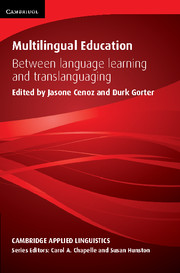Book contents
- Frontmatter
- Contents
- List of contributors
- Series editors’ preface
- Acknowledgements
- 1 Towards a holistic approach in the study of multilingual education
- 2 L1 as a pedagogical resource in building students’ L2 academic literacy: pedagogical innovation in the science classroom in a Hong Kong school
- 3 Linking content, linking students: a cross-linguistic pedagogical intervention
- 4 The role of the native language in the literacy development of Latino students in the United States
- 5 A nexus analysis of code choice during study abroad, and implications for language pedagogy
- 6 Multilingual practices in foreign language study
- 7 Language choices and ideologies in the bilingual classroom
- 8 Communicative repertoires in the community language classroom: resources for negotiating authenticity
- 9 Complementary classrooms for multilingual minority ethnic children as a translanguaging space
- 10 Constructing in-between spaces to ‘do’ bilingualism: a tale of two high schools in one city
- 11 Becoming multilingual and being multilingual: some thoughts
- Index
5 - A nexus analysis of code choice during study abroad, and implications for language pedagogy
Published online by Cambridge University Press: 17 September 2021
- Frontmatter
- Contents
- List of contributors
- Series editors’ preface
- Acknowledgements
- 1 Towards a holistic approach in the study of multilingual education
- 2 L1 as a pedagogical resource in building students’ L2 academic literacy: pedagogical innovation in the science classroom in a Hong Kong school
- 3 Linking content, linking students: a cross-linguistic pedagogical intervention
- 4 The role of the native language in the literacy development of Latino students in the United States
- 5 A nexus analysis of code choice during study abroad, and implications for language pedagogy
- 6 Multilingual practices in foreign language study
- 7 Language choices and ideologies in the bilingual classroom
- 8 Communicative repertoires in the community language classroom: resources for negotiating authenticity
- 9 Complementary classrooms for multilingual minority ethnic children as a translanguaging space
- 10 Constructing in-between spaces to ‘do’ bilingualism: a tale of two high schools in one city
- 11 Becoming multilingual and being multilingual: some thoughts
- Index
Summary
Ideal worlds and real worlds
The purpose of this chapter is to analyse the code-choice practices of a group of US university students studying abroad in Germany, in part in order to gain insights into how those practices might inform our thinking about foreign language pedagogy and teaching practice. The approach taken is an adaptation of Scollon and Scollon's ( 2004 ) nexus analysis, which allows us to examine code choice at the nexus of multiple, intersecting discourses, as one element in the complex system that is the student living, studying and using languages abroad. I will show here that in order to orient pedagogy towards meaningful training in being multilingual, it is useful and productive to consider aspects of second language (L2) learners’ assessments and experiences of using their first and second languages while abroad.
At the start I own up to a certain bias: As a language teacher and a former study-abroad student myself, I envision each student's experience of living abroad in a new language and culture as a series of challenging and meaningful connections with the Other, as the development of intercultural competence comprising new skills, perspectives and forms of critical knowledge (Byram, 1997 ), as ‘immersion’ in the L2 and the multiple worldviews and cultural frames of its speakers in ways that bring the student to critically examine her or his own worldviews and cultural frames. My approach to the design of a language curriculum in German often imagines the students’ study-abroad experience in this way.
The reality of it is, of course, quite different, and immensely variable from individual to individual, which always makes thinking about curriculum and teaching difficult. Some students may not ‘immerse’ themselves in the L2, may not engage extensively with people in the L2 society and perhaps are not as transformed as language teachers or they themselves would imagine or hope for (Kinginger, 2010 ). As participants in the L2 society, they may remain on the periphery, looking in from the outside, not entirely unlike the way they studied the L2 and its culture remotely in the language classroom back home, but now with the unmitigated experience of being there, of seeing, hearing, feeling, tasting and smelling it first-hand rather than having it mediated through books, recordings and websites.
- Type
- Chapter
- Information
- Multilingual EducationBetween Language Learning and Translanguaging, pp. 84 - 113Publisher: Cambridge University PressPrint publication year: 2015
- 7
- Cited by



